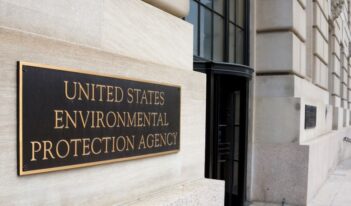
Courts constrain presidential tariff authority, bar National Guard domestic deployments, restrict Google’s preloading deals, and more…
IN THE NEWS
- The U.S. Court of Appeals for the Federal Circuit ruled that many of President Donald J. Trump’s tariffs exceed his legal authority, finding that the power to impose duties lies primarily with Congress. The Federal Circuit held that the International Emergency Economic Powers Act permits Presidents to regulate imports during national emergencies but does not authorize sweeping tariff regimes. The court left the tariffs in place for now while directing a lower court to reconsider its nationwide injunction, giving the Trump Administration until October to seek U.S. Supreme Court review. President Trump criticized the ruling as an improper constraint on presidential power and warned that it would “literally destroy the United States of America” if allowed to stand.
- A federal judge blocked the Trump Administration’s expansion of expedited deportations, ruling that it violated the constitutional rights of migrants. Judge Jia Cobb of the U.S. District Court for the District of Columbia held that the policy, adopted in January, unlawfully exposed millions of non-citizens to be apprehended anywhere in the country—not just at the border—if they could not show two years of residence. The U.S. Department of Homeland Security denounced the decision as judicial overreach, insisting that the Administration had clear authority under federal law and a mandate to deport “the worst of the worst.”
- The U.S. District Court for the Northern District of California prohibited the Trump Administration from using National Guard soldiers for domestic law enforcement purposes. Judge Charles R. Breyer found that President Trump and Secretary of Defense Pete Hegseth violated the Posse Comitatus Act by federalizing the California National Guard and deploying it alongside U.S. Marines to Los Angeles beginning in June 2025. The court determined that troops were deployed to enforce federal laws without state approval and to conduct security patrols, as well as traffic, crowd, and riot control—functions specifically prohibited by the Posse Comitatus Act.
- The U.S. District Court for the District of Columbia prohibited Google from entering into exclusive contracts to preload its search engine, Chrome internet browser, Gemini artificial intelligence platform, and Play Store application onto desktop and mobile devices. The remedy followed Judge Amit P. Mehta’s finding that Google violated the Sherman Antitrust Act by maintaining an unlawful monopoly. The court, however, declined to adopt the Department of Justice Antitrust Division’s request that Google be forced to divest its Chrome internet browser and Android operating system. The court also required that Google make certain user interaction data and targeted advertisement services available to competitors.
- Secretary of State Marco Rubio revoked visas for Palestinian Authority (PA) officials and members of the Palestine Liberation Organization (PLO), including President Mahmoud Abbas, ahead of the 80th United Nations General Assembly. The move followed guidance directing diplomats to refuse nonimmigrant visas to all Palestinian passport holders, including children seeking medical assistance through American charities such as Heal Palestine. The State Department said that it is willing to reconsider restrictions if the PA and PLO “repudiate terrorism” and cease “efforts to secure the unilateral recognition of a conjectural Palestinian state” through appeals to the International Criminal Court and International Court of Justice. The State Department said that PA staff who are part of the permanent mission to the United Nations will receive waivers to continue their regular duties as required by the United Nations Headquarters Agreement.
- The U.S. District Court for the District of Massachusetts ruled that the Trump Administration acted unlawfully when it froze nearly $2 billion in federal research grants to Harvard University. Judge Allison Burroughs held that the funding freeze, announced after Harvard resisted demands to change its handling of antisemitism claims on its campus, violated the university’s First Amendment rights and the Administrative Procedure Act. Judge Burroughs criticized the Trump Administration for using antisemitism as a “smokescreen” for a politically motivated attack on higher education. The Trump Administration reportedly vowed to appeal, while Harvard’s president welcomed the ruling as a safeguard for academic freedom and ongoing research.
- The U.S. Department of Justice filed a lawsuit against Illinois for allegedly violating federal immigration law by offering in-state tuition and state financial aid to undocumented students at public colleges and universities. The Justice Department argued that Illinois’s laws violate federal statutes that prohibit providing certain postsecondary benefits to noncitizens who lack lawful status. Illinois enacted the laws in 2003 and later expanded them through measures such as the 2019 Retention of Illinois Students and Equity Act. This case is the first in which the Justice Department has targeted a Democratic-led state over immigrant tuition policies.
- The Federal Trade Commission (FTC) announced that Disney will pay $10 million to settle FTC allegations that the company violated the Children’s Online Privacy Protection Rule by failing to label certain Disney-uploaded YouTube videos as “made for kids” and thereby enabling the collection of children’s personal data. The complaint alleges that Disney failed to notify parents or obtain their consent before data collection. The proposed order would require Disney to create a program to review whether any YouTube uploads should be designated as “made for kids” unless YouTube implements technologies to determine viewers’ age. Disney reportedly commented that the settlement only concerns distribution of some content on YouTube, not Disney-owned platforms, and that supporting kids’ safety and compliance with children’s privacy laws remain core commitments.
WHAT WE’RE READING THIS WEEK
- A recent U.S. Government Accountability Office (GAO) report examined how the U.S. Customs and Border Protection (CBP) has planned for and managed temporary “soft-sided” facilities—steel-framed, tent-like structures used to process and hold migrants at the southwest border. The report found that between 2019 and 2024, the CBP spent more than $4 billion on these facilities but often failed to plan adequately for staffing, operations, or costs. GAO also reviewed the ongoing efforts by the Department of Homeland Security to construct five permanent “Joint Processing Centers,” which could cost more than $7 billion, and determined that construction began without reliable cost estimates or clear site-selection criteria. GAO recommended that DHS and CBP improve how they plan and oversee these projects, including by producing more reliable cost estimates, setting clearer criteria for choosing facility locations, and providing better training for officials who manage contracts.
- In a recent Brookings Institute essay, three scholars from Brown University, Matthew A. Kraft, a professor of education and economics, and Sohil Malik and Grace T. Falken, both at the Annenberg Institute, argued that American schools are threatened by climate change but are also in a unique position to help implement solutions. Kraft, Malik, and Falken surveyed pre-kindergarten through twelfth grade schools and found that a quarter were located in census tracts designated by the Federal Emergency Management Agency as very high risk for environmental hazards. They argued that schools must address these issues through investments that create climate resilient educational infrastructure and through curricular changes that prepare students for employment in fields such as clean energy. Kraft, Malik, and Falken concluded that despite cuts in federal funding, state and local regulations are effectively tackling some of these challenges.
- In a recent Brookings Institution essay, Olivia Howard, a former senior research assistant at The Hamilton Project, Lauren Bauer, a fellow in economic studies at Brookings, Celine McNicholas, director of policy and government affairs at the Economic Policy Institute, and Margaret Poydock, a senior analyst at the Economic Policy Institute, tracked the administrative data collected by the National Labor Relations Board (NLRB) to assess the frequency and reasons for the closure of NLRB cases. The Howard team reported that NLRB regional directors have closed a similar number of cases in 2025 as in recent years, though the share of election cases closed by withdrawal has ticked up since late 2024. They also noted that since August 21, 2025, about 1,700 new election petitions have been filed, less than in 2024 but more than most recent years. Howard and her coauthors emphasized that, after President Trump fired Gwynne Wilcox as member of the NLRB,, leaving the five-seat NLRB with two members and, as a result, without a quorum, regional-director activity remained the key gauge of NLRB operations because many cases could proceed without NLRB decisions.
EDITOR’S CHOICE
- In an essay in The Regulatory Review, Daniel A. Farber, the Sho Sato Professor of Law at the University of California, Berkeley School of Law, examined the U.S. Supreme Court’s stay of an Environmental Protection Agency (EPA) interstate air pollution regulation in Ohio v. EPA. Farber traced how, after months of delay, states’ broad challenges to the EPA rule resulted in a U.S. Supreme Court stay of the EPA rule grounded in a narrow, likely fixable technicality: that EPA failed to clarify whether it relied on nationwide or state-specific cost data during the rulemaking process. Farber highlighted Justice Amy Coney Barrett’s dissent, which called the stay “underdeveloped” and noted that the Clean Air Act’s discretionary “may reverse” standard, unlike the Administrative Procedure Act’s “shall”, allows courts to leave rules in place when there is no good reason to vacate besides technicalities. Farber recommended that the Court curb emergency interventions and await lower-court records before wading into complex regulatory disputes.



